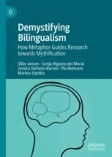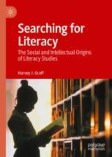Search
Search Results
-
Shifting Views of L2 Writing
This chapter reviews current practices in L2 writing assessment, including the dominant models that inform contemporary L2 writing tests. Criticisms...
-
Comparative Legal Translation: Chinese Law and EU Law
Legal translation plays a significant role for Chinese law to form self-expression under the global legal pluralism. The launch of the “Belt and Road...
-
Policy Discourses in the EPA Programme
Chapter 3 proffers the conceptual underpinnings of the book, together with the data collection and...
-
Best Practices and Language Policy Designs: Lessons from Canada and Wales
This chapter considers the ways in which language policy and planning in Canada have informed Colin Williams’s work. These include issues concerning...
-
Languages as Entities, Substances, and Containers: The Ontological Foundations of Language Myths
This chapter discusses ontological metaphors, that is, the conceptualization of abstract phenomena, such as language(s) in terms of objects,...
-
Desvendando CLIL no Brasil: Course Participants’ Experiences of an Online CLIL Teacher Education Programme During the Covid-19 Pandemic
As a pedagogical innovation, CLIL has only recently made it to Brazil. Unsurprisingly, little has been done in the way of implementing and...
-
Group Homogeneity
From the social identity approach and social categorization theory to more recent research linked, for instance, to the common ingroup identity...
-
Introducing the Gab Hate Corpus: defining and applying hate-based rhetoric to social media posts at scale
We present the Gab Hate Corpus (GHC), consisting of 27,665 posts from the social network service
gab.com , each annotated for the presence of...
-
Hawthorne’s New Pilgrim’s Progress and Antebellum America: Subversion and Containment in “The Celestial Railroad”
This paper studies Nathaniel Hawthorne’s “The Celestial Railroad” as a critique of Bunyan’s visionary tale, Pilgrim’s Progress, and examines the...
-
Where is Politeness?
This chapter offers a panorama of politeness as a specialized field within the pragmatic perspective of linguistics. Metaphorically, it is a first...
-
The emergence of case matching in discontinuous DPs
This paper explores a distinction between two phenomena that yield multiple realizations of case associated with one nominal. The first is the...

-
Examining fidelity reporting within studies of foundational reading interventions for elementary students with or at risk for dyslexia
Early access to evidence-based reading intervention improves outcomes for students with or at risk for reading difficulties. Additionally, teacher...

-
Psychology: Between Mind and Culture
From Havelock to Ong to Goody, there are strong, determinist theories of the consequences and implications of literacy. Directly and indirectly, they...
-
Narrative Inquiry as an Inquiry-Based Approach to Teacher Development
This chapter focuses on narrative inquiry as inquiry-based approach to the teacher development of Assistant Language Teachers (ALTs) in Japan....
-
Empowering Teachers Through Mentoring Within Language Teacher Associations: Examples from Africa
This chapter discusses mentoring in Africa, a context where, historically, English language teaching and teacher education have generally been driven...
-
The Idealization Theory
In the traditional era, the issue of meaning was tackled in terms of realism, a theory of meaning which stipulates that the meaning of an expression...
-
The Good, the Bad, and the Yucky: Valenced Linguistic Intuitions and Linguistic Methodology
Linguistic intuitions are a central source of evidence for linguistic claims. One under-appreciated feature of linguistic intuition is its normative...
-
Eine pas très facile Leidenschaft? Die Entwicklung berufsbezogener Überzeugungen von angehenden Französischlehrkräften. Eine explorative Studie in Bachelorund Masterstudiengängen an der Universität Hamburg
Dieser Beitrag stellt die berufsbezogenen Überzeugungen (BÜ) von angehenden Hamburger Französischlehrer_innen in zwei Momenten der universitären...
-
What Emerges from a Dynamic System?
Politeness research is interested in the gap between the individual and the social dimension (e.g. culture) because the concrete data of speakers in...
-
Computation and Representation in Cognitive Translation Studies
A separation is recently being construed within cognitive translation studies (CTS) between translation process research (TPR) and cognitive...
